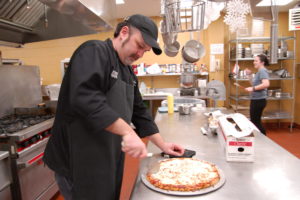
Joshua Charbonneau, head chef at the Brodhead Dining Hall, cuts into a cauliflower pizza on Wednesday, Feb. 27, 2019, in the Brodhead kitchen. Chef Charbonneau brings an innovative and sustainable approach to cooking in the Brodhead House. (Brigit Sullivan/B&W Staff)
Most people throw away their watermelon rinds. Few people eat the pineapple’s core. Although throwing out these scraps may seem insignificant, these scraps add up, contributing to the 150,000 tons of food that Americans throw out every day.
However, Joshua Charbonneau, Brodhead Dining Hall’s head chef, refuses to ignore food waste.
Charbonneau has been a chef at Lehigh for four years, previously working at Muhlenberg College. He strives to be as sustainable as possible in the kitchen, regularly practicing root-to-stem cooking, a cooking ideology where every part of a fruit or vegetable can be used. He said his goal is to reduce food waste.
Charbonneau began practicing root to stem cooking a year and a half ago. He started to experiment with fruit food scraps, making a tea out of leftover pineapple cores and coleslaw out of watermelon rinds.
“Stuff that normally gets tossed, we’re using that,” Charbonneau said. “We’re just trying to use everything. The big thing is ‘feed people not landfills,’ and I live by that rule.”
He said he believes food sustainability cannot be approached by students alone. It requires a mutual effort on the chef’s part, too.
One of Charbonneau’s favorite things to re-purpose is the juice that garbanzo beans are canned in. Charbonneau uses the juice, called aquafaba, to make chocolate moose, vegan moose, and even vegan mayonnaise. Otherwise, this juice would normally be discarded, further contributing to food waste.
“For me it’s more of a challenge of trying to come up with something out of nothing,” Charbonneau said.
Brodhead’s relatively small size, compared to other on-campus dining halls at Lehigh, allows Charbonneau to more efficiently utilize food scraps.
In fact, when Rathbone has its “back to the roots menu,” all the food is prepared in Brodhead Dining Hall and shipped to Rathbone afterward.
“I’m trying to reduce our carbon footprint, but I’m also trying to cut down on food costs,” Charbonneau said. “If we can use all the scraps and our food cost goes down, we can start bringing in some really cool things and have some really fun nights.”
Charbonneau said most students do not realize that the food is prepared with food scraps; it is just incorporated into most meals.
“I’ve been doing it very quietly,” Charbonneau said. “It’s not something I want to do to be like, ‘Oh, look what I’m doing.’ I’m just doing it because it’s the right thing.”
Tariq Al-Serhan, ‘21, a Brohead resident, said he was unaware of Charbonneau’s re-purposing, but he has always acknowledged Charbonneau’s creativity.
“There’s always an option to try different things, and (Charbonneau) will come around and say ‘try this,’” Al-Serhan said. “He’s very personable and friendly and is always cracking jokes; he’s really funny.”
This summer, Charbonneau plans to further experiment with root-to-stem cooking in an effort to achieve his goal of making Brodhead Dining Hall 100 percent sustainable by the end of next school year.
Since the summer is often slower than during the school year, it makes it easier to practice sustainability and to try new recipes.
“It’s a process because there are some things that people believe just cannot be reused, but I try to not think like that,” Charbonneau said.
Julia Patridge, ‘22, met Charbonneau earlier this year at an Eco-Reps meeting, where he explained his cooking philosophy.
She said she was inspired by his practices and his efforts to reduce waste.
“Protecting the environment has always been important to me and hearing how easy it is to reduce food waste challenged me to incorporate this in my own life,” Patridge said.
Charbonneau is enthusiastic about his progress thus far and is working toward reaching his goal of being 100 percent sustainable.
“Feed people, not landfills,” Charbonneau said. “That’s the biggest thing.”





Comment policy
Comments posted to The Brown and White website are reviewed by a moderator before being approved. Incendiary speech or harassing language, including comments targeted at individuals, may be deemed unacceptable and not published. Spam and other soliciting will also be declined.
The Brown and White also reserves the right to not publish entirely anonymous comments.